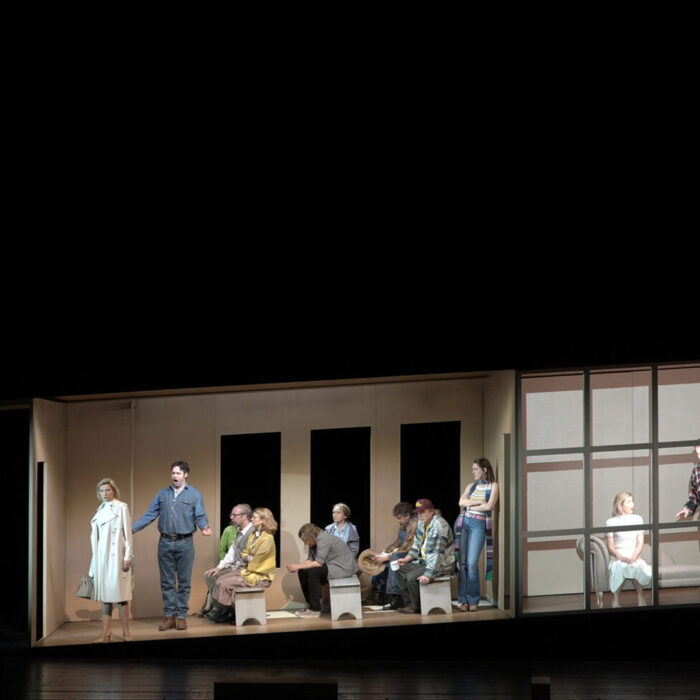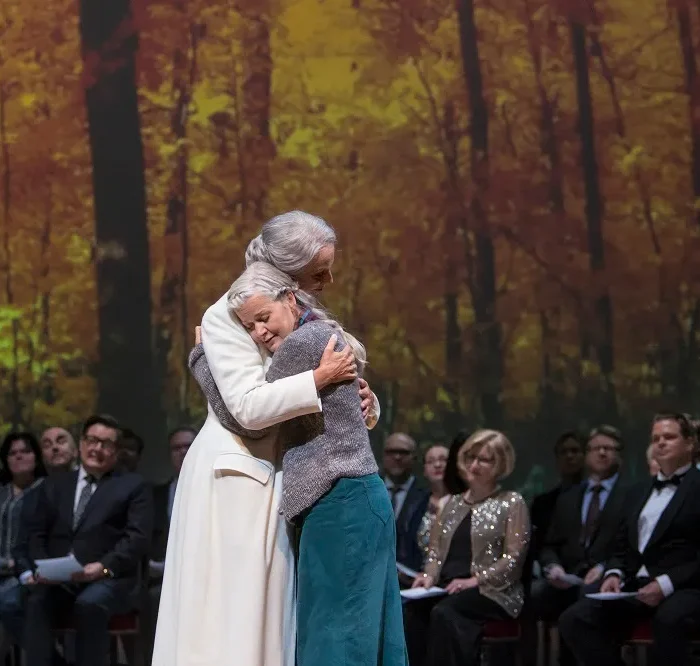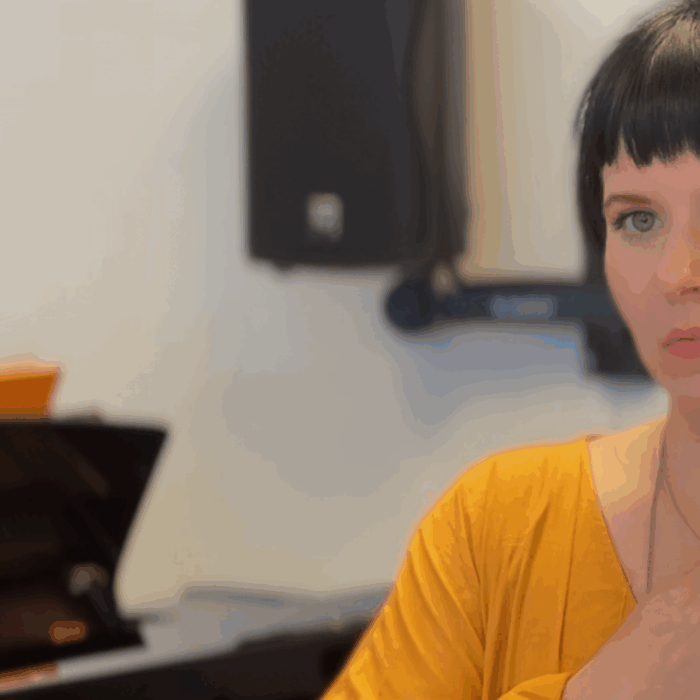
Opera Meets Film: A Conversation About ‘An OverKnight Success: The Crazy Life of an Opera Singer’
By John VandevertHaving recently become a Knight and awarded the prestigious, “Ordre des Arts et des Lettres,” baritenor Michael Spyres has quickly arisen as one of modern opera’s central luminaries, sensuously consonant with others like the ineffable Sondra Radvanovsky, the Puccini grande dame Angela Gheorghiu, Roberto Alagna, Susan Graham, Mikhail Kruglov, Allan Clayton, Elīna Garanča, and Javier Camarena to name only a few. And as one of opera’s most notable figures, and a modern opera singer at that, what he does outside of performing is just as important as what he does onstage. One of those achievements has been his work to modernize and artistically develop the Ozarks Lyric Opera, a seminal organ of American midwestern opera culture. First established in 1979 by “a small group of musical visionaries who wanted to bring opera to the Ozarks,” its first season featuring Gaetano Donizetti’s “L’Elisir D’Amore” and Puccini’s “La bohème,” the company became a bastion of lyrical repertoire.
By the early 1990s, the company was successfully integrating lesser-known American lyrical works like James Billings’ “Daughter of the Double Duke of Dingle” and Carlisle Floyd’s “Susannah” with popular European compliments like Mozart’s “The Marriage of Figaro” and Gian Carlo Menotti’s “Amahl and the Night Visitors.” Come the 2000s onwards and Ozarks Lyric Opera has mastered the art of the season, introducing audiences to seminal works of verismo perfection like Puccini’s many operas and Mozart’s comical morality tales, while tastefully integrating uncommon selections like Rick Besoyan’s “Babes in the Wood,” Arthur Sullivan and William Gilbert “Trial By Jury,” and Thomas Pasatieri’s “Signor Deluso.” For the company’s 68th season (2018), they combined Douglas Moore’s well-beloved opera, “The Ballad of Baby Doe,” with Johann Strauss II’s equally adored operetta, “Die Fledermaus,” while the year after Mark Adamo’s American classic, “Little Women,” was put alongside Mozart’s “Die Entführung aus dem Serail.” This season, the company combined Ludwig van Beethoven’s opera, “Fidelio,” with two popular music compliments, demonstrating the continued dedication towards creative programming, a hallmark of the company itself.
To celebrate the release of the new documentary discussing Spyres’ life and relationship to Ozarks Lyric Opera, I got the chance to sit down with both director Edoardo Zucchetti and Spyres to discuss pertinent elements of the film. In what follows, I will weave together both Spyres and Zucchetti’s responses and in doing so, reveal the beating heart of the documentary. Like Spyres shared, “becoming a Knight has only fanned the flames and passion that I have for opera,” and it seems this film expresses this and much more.
Origins of A Documentary
As Zucchetti shared, his relationship with Spyres began in 2010 when he was filming Mozart’s 1771 oratorio, “La Betulia liberata,” at the Salzburg Opera House. Unbeknownst to him at the time, Spyres had met with some musical figures and had casually met Edoardo. Flash to 2014 and after a chance meeting at the coffee station given their mutual work on the English National Opera’s production of Berlioz’, “Benvenuto Cellini,” the two quickly became friends soon after. In Edoardo’s words,
“The last day, Michael asked me to follow him in Germany…This connection with Michael gave us the chance to work and dream together. We made a documentary with a little money, something that the film industry can’t understand.”
Thus, the genesis of the documentary had begun. The central premise of the documentary was to be the convergence of life and opera through the perspective of this friendship between the filmmaker and the opera singer. Spanning over 10 years, the film took an intimate look at the relationship between the two and how life and opera relate to each other. As Edoardo wrote, “It [the film] is not just a documentary but a portrait of an artist with music and some friends.”
Spyres and Ozarks Lyric Opera
It can’t be denied that the career Spyres has had is not only rich, but robust and ongoing. From his 2009 debut in Rossini’s, “Il viaggio a Reims“ at La Scala, to his critically acclaimed performances like the role of Vasco da Gama in Meyerbeer’s “L’Africaine“ in 2018 with the Frankfurt Opera, Spyres has ventured through the operatic epochs with grace and success. However, one of those accomplishments has been his work at Ozarks Lyric Opera where he has acted as the Artistic Director since beginning his work with them in the early-2010s following the decision to settle down after an already substantiated career. At the time, the company had been called the ‘Springfield Regional Opera,’ originally founded by Dawin Emanuel, himself an accomplished opera singer who’d had a minor performance career with the Metropolitan Opera in the late-1950s. Emanuel had even had an academic career, lecturing in opera at Missouri State University.
As Spyres recalls, “I grew up with this company and learned what opera is all about with this company. My entire family sang in the chorus of various productions together and my first 6 professional roles were with SRO.” In fact, he’d met his wife at the company when they were both participating in a production of Mozart’s ‘ Le Nozze di Figaro.’ At the age of 23, he’d moved to Europe to deepen his career but reflecting on the beginnings, “I can honestly say that I would have never become an opera without this company.” However, in 2014 the situation with the company’s future became dire and out of deep adoration for the company, Spyres returned to the United States to breathe new life into the company given his now expanded contacts in the opera knowledge. As he remembers,
Even though I was busy singing all over the world and we had a 2-year-old and a newborn, I felt that I had to help keep this company alive and offered as much help as I could through my contacts and knowledge of the opera world.
Given the sparsity of operatic experiences in the area due to its rural and socioeconomic status, Spyres felt obligated to partake in the continued life of the company which had provided him both his career and his family. After coming on-board, the company has revived its essence and become stable in more ways than one. Everyone from his wife to his brother are involved in helping see that the company thrives and keeps its legacy going. As Spyres notes, “I have big plans for our region and company in the future and this is why I wanted a name to reflect this vision.” One of those plans includes the restoration of the touring opera model, a popular form of operatic exposure during the 1940s to the 1980s like that of the ‘Jeannette Thurber’s American Opera Company.’
Learning From A Synthesis
A through-line for both Zucchetti and Spyres is their syncretic embodiments of their experiences with opera, music, art, and performance. For Zucchetti, his navigation between the worlds of opera, cinema, and theater give him, “the opportunity to discover the world, the humanity of different people, cultures, thoughts, politics and arts…a different view of life.” The medium of a documentary, however, is not divergent from the expanding role of digital life. In his words, with the web, we are on a new step for film opera and documentaries.” As he notes, back in the 2000s the popularity of the “Three Tenors” helped spread opera to audiences around the world. This increased relationship between opera and the connected world in which we live has an immediate impact on opera companies.
As Spyres notes, one of the major difficulties in funding sources, “In the US you can have some houses that are around 90% private funding and only 10% subsidized by the government.” Another difficulty is the telos of an opera company itself, its motivation, and its contribution back to the community and society in which it sits. If a company “is not relevant or even welcome in a community then it will not be successful,” and because of this relationship, “we need everyone in society to make the art form successful no matter how large or small the company is.”
In an advantageous position where his copious amounts of performance experience in many different settings gives him an edge, Spyres gained the unique perspective of a performer and administrator. He noted just this, “ the most crucial aspect that is often not spoken about is the need for the artists and administrators to work more closely together.” This synthesis of roles allows for a more nuanced understanding of what a company needs to thrive both short-term and long-term regarding the desires and goals of a company which focuses on serving the public. Despite the difficulties, he remarked, “the greatest benefit of having one foot in both worlds is that you can be a liaison.” As a final reminder, Spyres noted,
“More administrators need to make an effort to understand the artistic side of our profession as well as the complications of the artist’s life and conversely performers need to understand the difficulties and pressures of administrative duties while learning how opera gets produced on stage.”
Categories
Opera Meets Film

